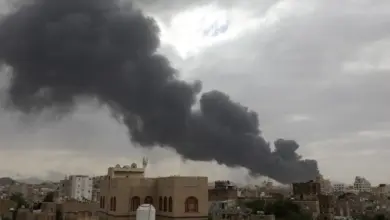Sanaa — Despite President Ali Abdullah Saleh’s Wednesday endorsement of Gulf Cooperation Council (GCC) mediation into the nearly three-month-long Yemeni political crisis, no affirmative stance has yet to take root within the high echelons of Yemen’s embattled government.
The GCC aims to end the standoff, which has brought thousands to the streets of the capital Sanaa and elsewhere throughout the nation, by negotiating the president's abdication. Saleh seeks blanket immunity from prosecution for himself and his family through the mediation effort. Youth activists, however, insist that condition is unacceptable.
On Wednesday, Yemen’s state-run Saba news agency quoted Saleh as stressing the “necessity of a serious and fruitful dialogue to overcome the current crisis."
Presidential Information Secretary Ahmed al-Sofi, however, told Al-Masry Al-Youm the GCC initiative “died before getting the chance to be born.” Al-Jazeera TV news channel, moreover, reported the GCC initiative included “undemocratic conditions,” according to government sources.
In accordance with such schizophrenic stances, Yassen Saeed Noman, head of the opposition coalition Joint Meeting Parties (JMP), said government officials were sending out “contradictory statements.”
“That reflects how confused the government is,” Norman said. “They couldn’t understand the crisis they led the country into and they are still betting on violence after losing their ability to deal with political solutions.”
Young anti-government protesters — who started the initial protests that led to sit-in demonstrations — and the JMP on Thursday welcomed the talks, marking the first time they responded positively to pressure from Gulf nations and Saleh geared towards national dialogue.
Despite accepting the GCC initiative, Norman said the “government is still maneuvering as usual.”
GCC representatives in recent days have indicated an unequivocal objective. Qatar’s Prime Minister Sheik Hamad ibn Jassim Jaber al-Thani on Thursday told his country’s official news agency QNA the six-nation GCC would "hope to reach a deal with the Yemeni president to step down." Such a declaration prompted both sides of the political deadlock to react accordingly.
“It was possible that the initiative could lead to a solution but they [the GCC] blocked it,” said al-Sofi. “When al-Thani declared that the initiative was only confined to the president stepping down, he assaulted the Yemeni people. He also offended Saudi Arabia, the host country, and he cut any possible communication between the parties of the conflict in Yemen.”
Al-Sofi added that these statements “made any initiative shameful.”
JMP leader Mohammed al-Sabri said the GCC initiative includes three conditions. The first is the immediate departure of President Saleh. The second involves transferring power to Yemen’s vice president, according to Article 115 in the Yemeni Constitution, and the third stipulates the formation a National Unified Government to run the country during the transitional period.
“The GCC is only eager to ensure the transfer of power and they are busy discussing guarantees that Saleh and his sons resign safely,” said al-Sabri.
If the initiative is approved by all relevant parties despite a seemingly harsh negotiating climate, the time Saleh will be given to step down would be decided in light of the “serious collapses and how paralyzed the country is.”
One significant component that sets the GCC proposal apart from other proffered initiatives is the inclusion of youth protesters, the driving force behind Yemen’s sustained uprising.
“We discussed the importance of having a youth representation but they have to decide who and how they will be represented,” said Noman.
On Wednesday GCC ambassadors held a closed meeting with several members of the Independent Democratic Youth Coalition that consists of 43 movements based at the sit-in demonstration outside Sana’a University Tagheer (Change) Square.
Coalition representative Abdul Naser al-Dumani said the organization’s participation is contingent on one condition.
“As long as the initiative starts with Saleh stepping down then we welcome it,” al-Dumani. “But we want to make sure that it’s not about handing power to the opposition parties who have been dying for this to happen. We need to confirm that it’s not a revolution for power and that it’s a revolution to create a civil state.”
In a separate meeting with the coalition, Charles King, part of the political security desk at the British embassy in Sanaa, asserted the GCC initiative constituted the best opportunity for Yemen during this tough time.
“The British ambassador meet with the GCC ambassadors this week,” said King. “We want to know more details but the main point is the need for dialogue between Saleh and all the other groups.”
The coalition representatives discussed potential guarantees the European Union, the UK and their partners can provide to ensure mediation efforts secure the state envisaged by al-Dumani.
Meanwhile, in the absence of any political talks between the conflicting parties, the streets of Yemen have witnessed sustained violence and bloodshed. Almost 125 people have been killed by state security across the country since unrest erupted in mid-January, the Change Square media center contends. All of the deceased were shot to death. Security forces have also routinely used tear gas to disperse protesters.
According to the National Organization for Defending Freedoms and Rights, Yemen’s national security forces took three protesters from private hospitals after recent attacks.
And last week two protesters, in two separate incidents, were burnt with oil after leaving Tagheer Square. They were wearing T-shirts that had the words ‘Step Down’ inscribed on them. The two burnt protesters told Al-Masry Al-Youm pro-government bore responsibility. These two incidents happened on the same day in different streets.
“This is the third violation I have experienced,” said Maher Hassan, one of the burnt men. “The owner of my apartment is one of the president’s consultant’s bodyguards and he threatened me. He said that if I didn’t quit the protest he would kidnap my family and he did for 24 hours.”
Rashad al-Same’ee, the other burn victim, said President Saleh, on top of his personal victimization, was responsible for the death of four of his relatives in Taiz during demonstrations there.
“The men who burnt me were in a car that was mostly covered by Saleh’s photos,” said al-Same’ee. “They asked me why I was wearing this T-shirt and then burnt me. But that will never stop me from protesting.”



